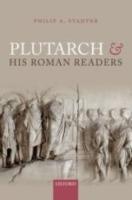
OUP (2014) h/b 394pp £80 (ISBN 9780198718338)
In the (useful) Introduction to this substantial book, S. comments that (roughly since 1971) the copious Greek essayist and biographer Plutarch (c. AD 46-120) has attracted ‘an explosion of books, commentaries, and articles, apparent in this volume’s bibliography’, in which S.’s own name appears 35 times. Donald Russell and Christopher Jones are singled out as pathfinders, but Christopher Pelling’s influence is also manifest. It should be noted that this not an ‘original’ work, since its contents have all appeared (or in three cases are about to appear) as articles published in a range of journals or books since 1992.
The 23 chapters fall into four headings: Two worlds—or One?; Writing for Romans; Statesmen as Models and Warnings; and Post-Classical Reception. S. is naturally looking at the many ways in which Plutarch’s Greek world interacted with the Roman one, especially via his important Roman friends—and patrons. However much Plutarch may have wished to emulate Plato’s (ultimately calamitous) attempt to create a philosopher-king, the brutal facts could not be escaped: statesmen had many other concerns besides philosophy, and all the material benefits of amicitia with, say, a senator flowed in only one direction. The relationship of Pliny to the emperor Trajan was on a different plane from that of Plutarch to the local Roman official Sosius Senecio.
Did Plutarch know Latin? Or, more precisely, how well did Plutarch know Latin? S. considers this important question in ‘Plutarch’s Latin Reading’, and concludes that Plutarch had a ‘comfortable knowledge of Latin, which could allow him to read Latin authors, even poets, which attracted his attention’. At the same time, while Plutarch ‘recognizes the particular beauty (Greek kallos) of Latin expression, he renounces the attempt to become expert’. (Some may think that kallos is not the most natural word to use about Latin, especially by comparison with Greek!)
This is just one example of what S. offers us, and those with an interest in any specific aspect of Plutarch’s works or career may well find that S.’s book satisfies their needs, though inevitably there is much repetition, and S. himself, in the modern manner, constantly draws on the work of others, whether for backing, praise, or (occasionally) disagreement; those less familiar should still start with Russell’s Plutarch of 1972.
For historians, individual commentaries on the Lives are essential (though arguments over his sources are unlikely to be resolved in a hurry: S. himself produced an edition of Plutarch’s Life of Pericles in 1989); philosophers note his opposition to the Stoics and Epicureans, as well as his veneration of Plato. Of all the authors featured in the Loeb Library, only Cicero has called for more volumes than Plutarch—and, even so, much has been lost: not bad for a Greek from Chaeronea who seems to have ridden out even the principate of Domitian with equanimity! Yet two questions remain unanswered: we know much about the intended readers of Plutarch’s works, but what S. cannot tell us, and what we cannot know is this: did the recipients actually read those works, and, if so, what did they think of them? This is an expensive book, with something of the characteristics of a ‘Companion’, and more for the university than the private library.
Colin Leach
